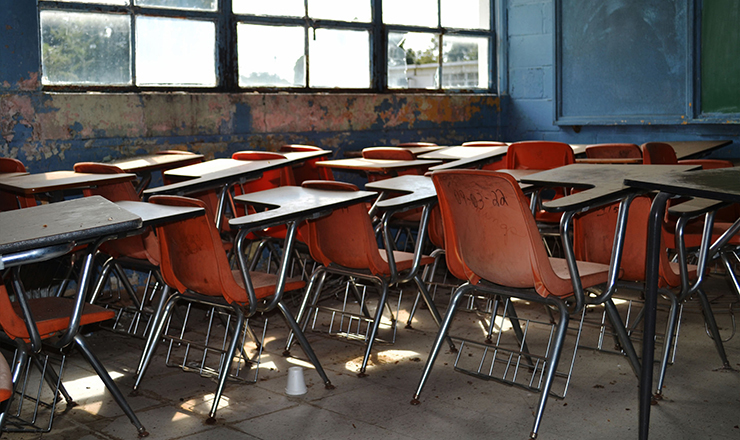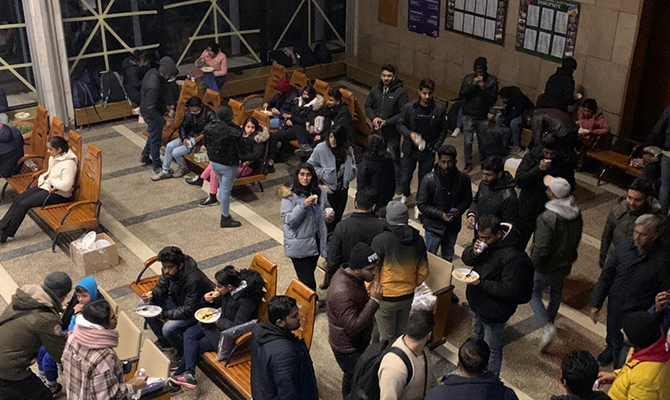The War in Ukraine Raises New Questions About How Best to Support Affected Students

Unfortunately, refugee students at the higher education level often face an uphill battle when trying to enroll in colleges and universities in their host countries.
With no end in sight, the war in Ukraine continues to ensnare the country, causing Europe’s worst humanitarian crisis in decades. Since its start, the conflict has forced nearly 13 million people—more than a quarter of Ukraine’s population—to flee their homes, according to the United Nations. More than 5 million have fled the country, with most heading to neighboring states such as Poland, Romania, and Hungary. Others have fled farther afield. Although resettlement numbers remain low, both the United States and Canada have introduced programs to welcome refugees from Ukraine.
As in any war, current efforts to support those fleeing the conflict have focused on meeting basic survival needs, such as the need for clothing, essential food and water, emergency shelter materials, and medical care. But with the war dragging on, finding ways to meet the non-material needs of refugees will become increasingly critical.
Ensuring that Ukrainian refugees have the freedom to access all levels of education will be particularly important. Unfortunately, refugee students at the higher education level often face an uphill battle when trying to enroll in colleges and universities in their host countries. One of the most intractable obstacles is the inability to obtain or verify their complete academic records. Without documents in hand that can prove their past education, refugee students will not qualify for admission to most higher education programs.
Fortunately, Ukrainians still in the country are working hard to ensure that those forced to flee can provide proof of their prior Ukrainian studies. WENR spoke over email with Tetiana Herashchenko, a senior specialist at the State Enterprise “Information and Image Center” of the Ministry of Education and Science of Ukraine, or ENIC Ukraine, to understand more about the students’ situation. For international credential evaluators hoping to develop rigorous guidelines for evaluating and authenticating refugee credentials, understanding the challenges that Herashchenko and her colleagues face will be essential.
Working Under Fire
The invasion brought everyday life almost to a halt. At the ENIC office in Kyiv, the capital of Ukraine, “the main concern was that all our employees were safe, alive, and well,” Herashchenko noted, adding that initially “the office suspended its functioning due to the difficult security situation around Kyiv and the uncertainty of the scale of the invasion.” As a result, the ENIC Ukraine website and the country’s official online verification system were knocked off-line.
But not for long. As Ukraine continues to defend its sovereignty against all odds, some aspects of life have returned to normal. At the ENIC Ukraine office, the doors have reopened, and the ENIC website is back online. “Remote work protocols developed and implemented during the COVID-19 pandemic came in handy,” Herashchenko noted in her email. “Fortunately, the office remained intact.”
This bit of normalcy has allowed Herashchenko and her colleagues to continue their work. Today, ENIC Ukraine is again verifying the academic documents of those who studied in Ukraine. “We are always trying to meet the needs of our applicants, especially now,” Herashchenko wrote. “We conduct remote reception of documents, answer questions received by phone, email, Viber, and telegram, and began to accept copies instead of the original educational documents for some services (where possible).” She also confirmed that “the verification procedure itself has not changed.”

Evacuation of international students from higher education institutions of Kharkiv to Poland after the Russian attack of Ukraine. Photo by: State Border Guard Service of Ukraine, via Wikimedia Commons.
But challenges remain, especially when verifying the documents of institutions in areas of heavy fighting. “At the moment, as long as active hostilities continue in the country, it is impossible to assess the state of archival data of many educational institutions. There is still no contact with many educational institutions and their employees. Some educational institutions cannot be reached due to constant shelling.”
This has made it impossible to verify the academic documents of certain students. “As the high threat of missile attacks persists across the territory of Ukraine, the vast majority of employees of educational institutions works remotely and is temporarily unable to promptly provide information from the archives.
“In such a situation, such a national information resource as Unified State Electronic Database on Education, which contains inexhaustible but significant information about each student, has become especially important,” she said.
The conflict in Ukraine also threatens the safety and well-being of the many international students who have long sought out the country’s colleges and universities. Many have fled Ukraine hoping to continue their education at institutions in their home countries or other locations. There, however, they face the same documentation issues that domestic Ukrainian students face when attempting to enroll in a new institution. “Both foreign students and Ukrainian students who have left for safe countries often do not have the appropriate documents on their periods of study in Ukrainian higher education institutions,” Herashchenko noted.
While efforts are underway to reopen institutions in safer parts of the country, students without appropriate documentation can still appeal to ENIC Ukraine for assistance. “For such appeals, we have developed a separate verification protocol and offer a statement on obtained educational qualification or period of study. For such verification we use the data of the Unified State Electronic Database on Education, contact with representatives of educational institutions, if possible” Herashchenko said. At the same time, she admits that in many cases, “if the educational institution has not yet resumed work, it is not possible to provide information about the passed disciplines and the student’s learning outcomes.”
Learning from the Past
These events have obviously had an impact on the evaluation of Ukrainian credentials around the world. In many ways, they mirror the challenges that evaluators faced in the aftermath of the military conflict in eastern Ukraine in 2014.
The annexation of Crimea and the war in Ukraine’s eastern territories have forced one higher education institution in Sevastopol, the largest city in the Autonomous Republic of Crimea, and 42 educational institutions in certain areas of the Donetsk and Luhansk regions to evacuate to different parts of Ukraine. Others remained, eventually adopting the system of education used in Russia, although ENIC Ukraine withdrew its licenses and accreditation in 2015. Today, ENIC Ukraine does not recognize credentials from universities in the country’s uncontrolled territories.
These developments have affected the evaluation of Ukrainian credentials. At World Education Services (WES), we took a two-pronged approach. For credentials issued by Ukrainian institutions in unoccupied parts of the country, WES worked closely with ENIC Ukraine to authenticate academic documents.
But for those students who had studied in Luhansk and Donetsk prior to the invasion, we had to take a different approach. Because the archives of these institutions were no longer accessible, we were unable to verify the authenticity of their documents through ENIC Ukraine. Instead, we offered applicants who had studied at now-occupied institutions the opportunity to have their credentials evaluated through the WES Gateway Program. The WES Gateway Program serves applicants who have only partial documentation of their education, who are seeking an evaluation report for education, licensure, or employment purposes in the U.S. or Canada, and who have been displaced as a result of adverse circumstances in the country where they were educated. (Those educated in six other countries may also be eligible for the WES Gateway Program.)
In the days that followed the 2022 invasion of Ukraine, when the ENIC Ukraine website went down, WES temporarily extended the Gateway Program to all areas of Ukraine.
For now, WES continues to work with ENIC Ukraine to evaluate and verify Ukrainian educational credentials. For applicants whose circumstances do not permit access to standard procedures, WES still provides the Gateway Program in the U.S. and Canada.
Still, we hope to do more. We understand the obstacles international students and refugees face. We are, therefore, working to develop additional programs that draw on our experience helping people to learn, work, and thrive in new places.
Frameworks for Evaluating Credentials During a Crisis
Displaced people have a right to have their educational qualifications assessed. There is a legal basis for this right in international law: Article VII of the Convention on the Recognition of Qualifications concerning Higher Education in the European Region, ordinarily known as the Lisbon Convention or LRC, calls on signatories to develop procedures for assessing refugee qualifications even in the absence of “documentary evidence” of their qualifications. Since the Convention was introduced in 1997, a number of nation states, including some outside of the European region, have either ratified or signed it into law.
The main entities responsible for implementing the Lisbon Convention are known collectively as the ENIC-NARIC Networks. These networks encompass national information centers from each of the Lisbon Convention signatory countries. These centers facilitate the recognition of migrant qualifications in Europe and in other major destination countries. They also share information about their country’s system of education and provide authoritative resources on credential evaluation matters. For example, fighting can archive or otherwise disrupt communications. Establishing rigorous and transparent procedures in evaluating educational credentials will help the recipients to understand and trust the reports. The Lisbon Recognition Convention (LRC) encourages a flexible approach to the recognition of qualifications held by refugees, displaced persons and persons in a refugee-like situation.
Within the text of the LRC, under Section VII, Article VII in regards to the recognition of qualifications held by refugees, displaced persons and persons in a refugee-like situation, it reads:
“Each Party shall take all feasible and reasonable steps within the framework of its education system and in conformity with its constitutional, legal, and regulatory provisions to develop procedures designed to assess fairly and expeditiously whether refugees, displaced persons and persons in a refugee-like situation fulfil the relevant requirements for access to higher education, to further higher education programmes or to employment activities, even in cases in which the qualifications obtained in one of the Parties cannot be proven through documentary evidence.”
As such, refugees, displaced persons or persons in a refugee-like situation who have formal education from a recognized and/or accredited educational institution and others who for valid reason and in spite of their best
persistent efforts cannot document the qualifications they claim, should have a right to have their qualifications assessed by a competent authority responsible for its recognition.
Several ENIC/NARIC offices have developed a procedure for the assessment of refugee qualifications. You can find more information on the services provided by a few ENICs/NARICs here.
Resources:
- ENIC-NARIC Networks
- Convention on the Recognition of Qualifications concerning Higher Education in the European Region